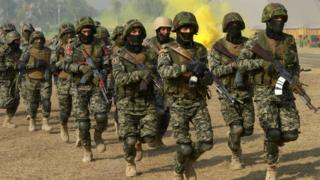 Image copyright
Image copyright
Getty Images
Those in favour of military courts argue that they are important because the government cannot provide adequate security for judges in terror trials
Pakistan’s lower house has passed a bill to reinstate secret military courts, despite criticism from human rights activists.
Military courts were first set up as a response to the bloody 2015 attack on a military-run school by the Pakistani Taliban that killed 134 children.
The courts, which try civilians charged with terrorism offences, had a two-year mandate that expired on 7 January.
The bill will now go to the senate on Wednesday for approval.
Viewpoint: How Peshawar military school massacre changed Pakistan
The government of Prime Minister Nawaz Sharif said in January it wanted to reinstate the military courts, but lacked the two-thirds majority in parliament. After months of discussions between parties, the bill was passed late on Tuesday.
Under the original secret military court system:
- Defendants were not allowed to hire their own lawyers – they were assigned one by military
- No media were allowed to observe proceedings
- The timing of the trial was not made public until the military announced a verdict
- There was no right to appeal
- Judged were not required to have law degrees or provide reasons for their verdict
The new bill, however, has some amendments, including allowing suspects to choose their own lawyer.
In the two years, the courts have given the death sentence to more than 160 people and these have resulted in numerous executions.
One of the main arguments made in favour of military courts is that the government cannot provide adequate security to judges who preside over terrorism related cases.
But critics say the courts lack transparency and due process.
Pakistan reinstates secret military courts despite criticism}

